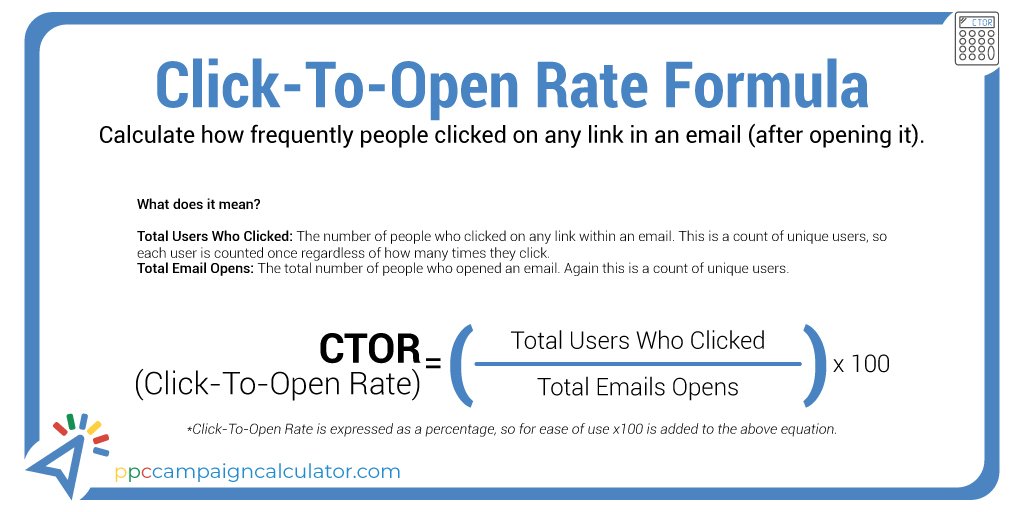CTOR Calculator (Click-To-Open Rate)
We have provided a useful online CTOR Calculator below. You can use it for free
to work out your Click-To-Open Rate.
You can also use it to derive the number of people needed to click on your email in order to hit a
target CTOR, as well as the necessary number of email opens.
Feel free to experiment with different scenarios using our Click-To-Open Rate Calculator in order to
help you better understand this metric.
CTOR Calculator
Introduction:
A Click-To-Open Rate (CTOR) Calculator is a tool used in email marketing to
assess the effectiveness of a campaign. It calculates the percentage of recipients that opened the
email and then clicked on a link or call-to-action (CTA) within it.
The CTOR provides a more concentrated perspective of engagement than the Click-Through Rate
(CTR) which calculates clicks based on the total number of emails sent. CTOR helps marketers
evaluate how appealing the email's content was to the subscribers who opened it.
How to Calculate Click-To-Open Rate?
To calculate the Click-To-Open Rate (CTOR) for an email campaign, you can follow these steps:
-
Determine the number of unique clicks:
Count the number of individuals who clicked on a link or call-to-action (CTA) in the email. This is usually offered by an email marketing platform or an analytics tool. -
Determine the number of unique opens:
Count the number of individuals who opened the email. Again, this information is typically available through your email marketing platform or analytics tool. -
Calculate CTOR:
Use the formula to calculate the Click-To-Open Rate:
CTOR = (Users Who Clicked x 100) ÷ Email Opens
Substitute the values from steps 1 and 2 into the formula to get the CTOR percentage.
Example:
Suppose there are:
Unique Clicks: 500 recipients
Unique Opens: 1000 recipient
Then,
CTOR = 500/ 1000 × 100% = 50%
So, in this example, the email campaign has a 50% Click-To-Open Rate. This signifies that 50% of the recipients who opened the email also clicked on a link or call to action inside it.
Why Click-To-Open Rate Calculator is important?
CTOR is not the same as CTR.
The Click-To-Open Rate (CTOR) Calculator is important in email marketing for various reasons:
-
Content Quality:
CTOR assists in determining the effectiveness of an email's content. A higher CTOR implies that the information was interesting and relevant to those who opened the email.email marketing platform or an analytics tool. -
Segmentation Insights:
By examining CTOR, marketers can learn which segments of their audience are most responding to email content. This information can be utilized to better target future advertising and segment the audience. -
Performance benchmarking:
CTOR is used to compare the performance of various email campaigns. It aids in the identification of long-term trends and patterns in audience involvement. -
Optimization Opportunities:
A low CTOR may indicate that the email's design, messaging or call-to-action can be improved. Marketers can use CTOR data to test out different aspects and improve campaign performance. -
ROI Measurement:
CTOR helps to calculate the return on investment (ROI) for email marketing initiatives. It allows for a better insight into how many people not only opened the email but also took action such as clicking on a link or CTA.
Factors Affecting Click-To-Open Rate (CTOR):
CTOR is not the same as CTR.
There are several factors that can influence an email campaign's Click-To-Open Rate (CTOR). These
factors include:
-
Relevancy of information:
The most significant factor influencing CTOR is the relevancy and quality of the information in the email. If the information is intriguing, customized and relevant to the recipient's requirements or interests, they are more likely to click on links or CTAs. -
Subject Line:
The subject line plays a major role in encouraging recipients to open your email. A precise, attractive and relevant subject line can boost open rates which in turn affects CTOR. -
Design and Layout:
The design and layout of the email especially the positioning and visibility of links or CTAs may affect CTOR. A well-designed email that directs recipients' attention to the intended action can result in better click-through rates. -
Call-to-Action (CTA):
The clarity, visibility and relevancy of the email's call-to-action buttons or links can have a major impact on CTR. A strong and captivating CTA entices recipients to take the desired action. -
Timing and Frequency:
The timing of the email's delivery and the frequency of communication can both affect CTOR. Sending emails at the right moment when recipients are more likely to engage can boost CTOR. -
Segmentation and Targeting:
By segmenting your audience based on their interests, behavior or demographics and targeting them with personalized content, you can increase your CTOR. Relevant material customized to certain categories resonates more with recipients. -
Sender’s Reputation:
The sender's reputation which includes criteria such as domain reputation, email authentication and sender identification, can have an impact on email deliverability and consequently, CTOR. -
Mobile Optimization:
With mobile devices accounting for a substantial share of email openings, optimizing emails for mobile responsiveness and usability is essential for enhancing CTOR.